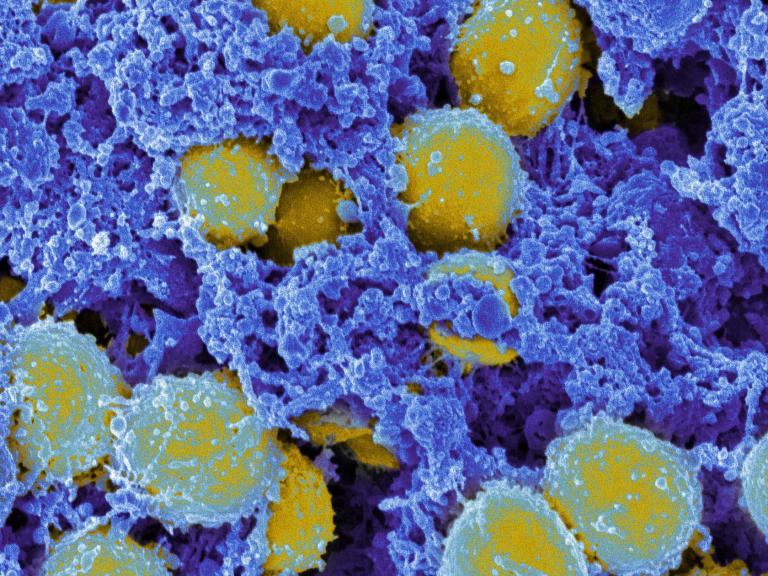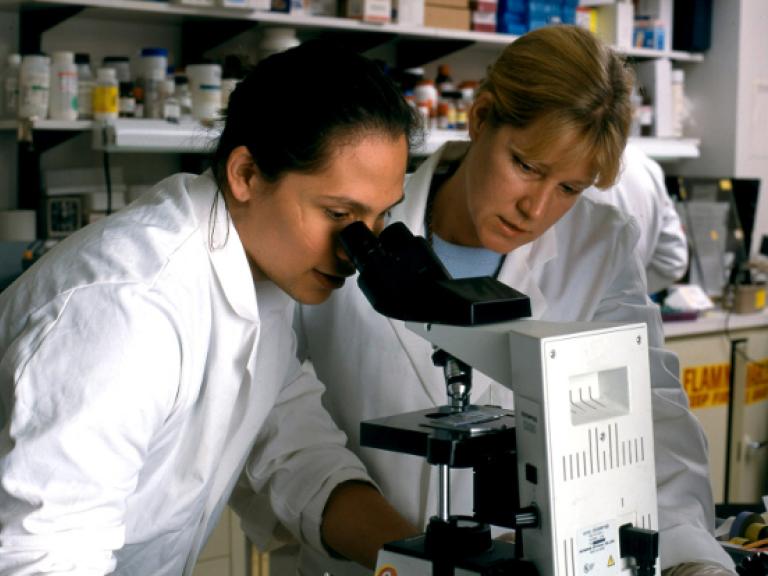NIAID is funding and conducting research on many aspects of antimicrobial (drug) resistance, including basic research on how microbes develop resistance, development of new and faster diagnostics, and clinical trials designed to find new vaccines and treatments effective against drug-resistant microbes.
Through the information offered here, researchers can learn about the science being conducted at NIAID and by NIAID-funded researchers. Researchers seeking funding can access opportunities to further their own research, while NIAID and NIH grantees can find out about available resources outside of specific funding opportunities. Recent publications, active networks, and ways to connect with other researchers are also available.
Highlights

Scanning electron micrograph of Staphylococcus aureus bacteria.
NIAID Workshop Report: Systematic Approaches for ESKAPE Bacteria Antigen Discovery
On November 14 -15, 2023, NIAID organized a workshop "Systematic Approaches for ESKAPE Bacteria Antigen Discovery" to engage microbiologists, vaccinologists, immunologists, genomicists, and infectious disease physicians to explore novel technologies and to address and identify current roadblocks that impede advances in antigen and vaccine discoveries for the ESKAPE pathogens (Enterococcus faecium, Staphylococcus aureus, Klebsiella pneumoniae, Acinetobacter baumannii, and Enterobacter species).

NIAID’S Antibiotic Resistance Research Framework: Current Status and Future Directions
This report describes NIAID’s portfolio of basic, translational, and clinical research in AR and outlines an updated array of innovative approaches based on the latest scientific advances and research opportunities to address this urgent public health priority.
NIAID’S Antibiotic Resistance Research Framework: Current Status and Future Directions
Support for Research
Funding
NIAID is always accepting researcher-initiated applications. Connect with NIAID program officers about potential funding for antimicrobial resistance research.
- Dr. Erica Raterman, Preclinical Services Program Manager, Bacteriology and Mycology Branch, Division of Microbiology and Infectious Diseases
- Dr. Erin Zeituni, Product Development Program Manager, Bacteriology and Mycology Branch, Division of Microbiology and Infectious Diseases
See a list of research initiatives focused exclusively or in part on antimicrobial resistance
Resources for Researchers
NIAID offers resources such as technologies available for licensing or collaboration, computer applications, and other tools and services to the general scientific community to advance basic, preclinical, and clinical research. See all resources for antimicrobial resistance researchers.
For researchers developing products such as diagnostics, vaccines, or drug therapies, check out NIAID's support for infectious disease product developers.
Connect With Other Researchers
Search for scientists at NIAID who research antimicrobial resistance in the scientist directory.
Search for scientists funded by NIAID who research antimicrobial resistance on RePORTER.
Programs and Networks
NIAID funds several programs and networks to advance research on antibiotic-resistant pathogens.
Antibacterial Resistance Leadership Group (ARLG)
The ARLG is a clinical network composed of scientific experts from government agencies, academic institutions, and nonprofit and industry groups around the world. The ARLG oversees a clinical research network that conducts studies on important aspects of antimicrobial resistance, including testing novel therapeutics and diagnostics.
Combating Antibiotic-Resistant Bacteria Interdisciplinary Units (CARBIRUs)
The CARBIRUs are multidisciplinary research centers focused on bacterial pathogens for which antibiotic resistance poses a significant public health concern.
Partnerships
An issue as complex as antimicrobial resistance requires a comprehensive approach that draws upon not only federal agencies and academic researchers, but also industry, healthcare providers, and individual citizens to advance basic and applied research as well as to support public health efforts.
Read more about some of our partners:


